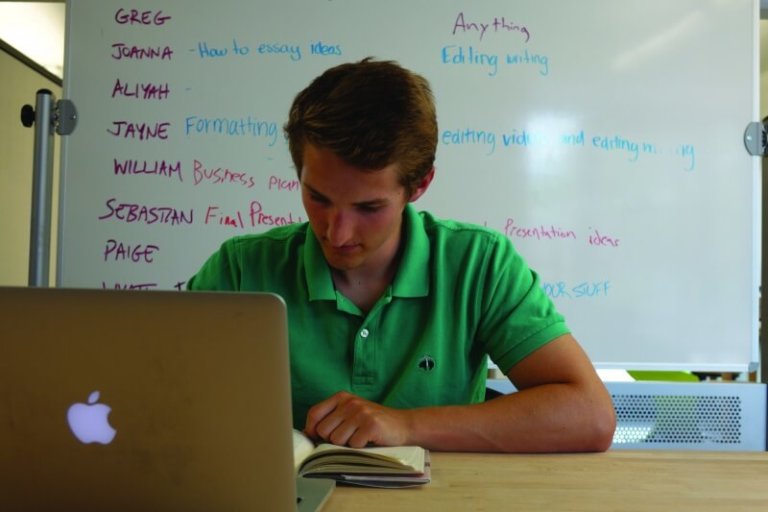What happens when you give students the freedom to innovate through a self-directed learning program? That was the question behind Colorado Academy’s REDI Lab, a “school-within-a-school” experience that allows students the opportunity to dive into an area of personal interest by exploring a project of their choice.
Junior Greg Cain is one of those students. Seated at the long, wooden table punctuated by black chairs, he says that he applied to the 12-week program due to its access to autonomy.
“I saw it as an opportunity to take charge of my own education and escape the routine of my typical school life,” says Cain. “Moreover, I saw the self-directed learning aspect of the program as a chance to make my education more efficient.”
Filing in at the start of class, the nine juniors taking the course leisurely pull out their laptops and materials and get to work. There are no assigned seats and no one is taking attendance. There are no teachers standing at the front of the classroom ready to lecture. Instead, students in the REDI Lab, which stands for Research, Entrepreneurship, Design, and Inquiry, are expected to hold themselves accountable. As such, their workspace is surrounded by whiteboards scribbled with deadlines. Next to each name on one whiteboard are two columns that read: “What I Need,” and “What I Can Help With.” There, students collaborate on where they are struggling and where they can lend a hand.
The idea for the REDI Lab, which was designed by co-directors and Upper School teachers Paul Kim and Tom Thorpe, was born when Kim began to brainstorm ways to leverage CA resources to meet the learning needs of students born with unlimited access to information. One of the key innovations of the REDI Lab is its ability to realign time during the school day to give students more opportunity for deeper learning. Students still take a few of their other classes.
“There is not really a defined structure to the program,” says Kim. “We are more like curriculum designers. We try to design personalized learning pathways for our students based on their individual needs and interests.”
Today, for Cain that means reading Zen Mind, Beginner’s Mind, by Shunryu Suzuki. The book on Zen teachings serves as research for Cain’s project on critical thinking and truth. Inspired by current events regarding fake news, Cain decided he would “analyze fake news and how to combat it ‘apolitically’.” Cain’s final project will be three podcasts that document his analysis and ideas. “I will talk about how to determine the truth in an increasingly complex society,” says Cain.
Working beside Cain on a much different project is junior Ryan Antenucci. He is combining his love for filmmaking – which he picked up in Digital Video class – with that of the Maker Movement in order to create a YouTube channel featuring high-quality films for makers.
“Most ‘build videos’ are either low quality and boring, or fine quality and boring. I’m targeting more of an advanced maker who wants to see some skills, but then also be entertained,” says Antenucci.
His videos, which feature the use of skills like metal-working and welding, include how-to’s on making obscure objects like metal toothpicks, or a brass-tipped pen made from a condor feather. Antenucci utilizes time in class to edit film he’s created in his workshop at home.
For both Antenucci and Cain, the unstructured nature of the REDI Lab presents both an opportunity for growth, and one for struggle.
“REDI Lab gives greater flexibility, as well as more individualized support,” says Cain. “It also provides an environment that challenges and invites more nuanced thought. But as with everything, there are downsides. I have struggled throughout the trimester to find the best practices and work processes to make the most of my time.”
Adds Antenucci: “I really like the idea of REDI Lab and the time it gives me to work on the things I’m interested in. I also really enjoy the collaborative aspect of it. Sometimes, though, I don’t know if I’ve spent my time in class wisely.”
Likewise, the students’ parents have seen a shift in how they view school. Says Cain’s mother, Suzie Fishman: “Greg seems to be having more thoughtful conversations with his instructors. He has been challenged to drive the agenda. He has been focusing on creating more quality than just quantity of work.”
As with everything, the REDI Lab is what you make of it. As the teachers and students learn together, both Kim and Thorpe hope the greatest takeaway will be to “learn to love learning,” as opposed to pursuing knowledge only for a grade.
“I would like students to have a more intentional relationship with school – for them to know what the impact of intrinsic motivation is in connection to their learning,” says Thorpe. “I would also like them to learn for themselves and not necessarily for their teachers.”
Meanwhile, the day is ending and Cain puts down his copy of Zen Mind, Beginner’s Mind. Cain, an avid rower who recently participated in the Central Youth Regional Rowing Competition, earning a second-place finish, says the book made him think a lot about the sport.
“That could be because, like the philosophy written about in that book, rowing is more about process and about small details than it is about the end result,” says Kim.
“It’s funny you should mention that,” says Cain, “because I was just thinking the same thing.”
Almost as an afterthought, Kim adds: “Many students don’t realize that it’s the same for learning. If students would focus on the process, then they would most likely earn the grade they desire. But many mistake the grade for something that it’s not. Somewhere along the line the best students have learned to learn while also earning the grade.
